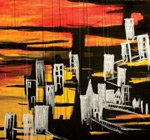The most compelling aspect of the 1990s post-rock aesthetic, constructed particularly by bands on the Constellation label, was the radical political ideals that seemed to be necessarily bundled up with the sounds. Godspeed You! Black Emperor combined equal parts dark cynicism and biophilia to construct a practical and rationally hopeful anarcho-inspired vision of the world. The brooding string dirges and anti-authoritarian rants presented a capitalistic form of life that was quickly devouring itself. But between the lines of their critique, the collective revealed traces and hopes of a possible future in which humans could organize the world according to more egalitarian, sustainable, and life-enhancing principles.
Do Make Say Think’s conception of instrumental rock harnessed a similar political philosophy, but significantly altered the sounds and approach associated with it. At times, it felt like Godspeed were ramming their politics down your throat, especially on tracks like “Dead Flag Blues” and “Blaise Bailey Finnegan III.” In contrast, Do Make Say Think abandoned verbal expression completely in order to open up more contemplative spaces for the listener, thus providing a domain suitable for an autonomous form of thinking. Do Make Say Think also prioritized the celebratory and optimistic aspects of their political values through the music, while Godspeed minimized these features within the doomful world that they portrayed. Even the name of the band itself, consisting of four action verbs, is celebratory and hopeful. One is initially tempted to interpret the name as signifying the actions of the heroic artist, but given the non-hierarchical and egalitarian political values of the Constellation post-rock aesthetic, it is more likely that the name is motivated by the radical possibility of autonomous human agency and mutual-association.
On Other Truths, the band’s sixth studio LP, Do Make Say Think return to themselves, namely to their own name, to try to re-explore and re-emphasize these radical possibilities. Each of the four songs on the album specifically articulate the individual concepts that act as both the building blocks of their name and the political position that is expressed through them. The concepts, though, are unified and overlapping, and so cannot be isolated. Just as Do Make Say Think create songs unsuitable for the single format, their albums are meant to be experienced as a totality; the co-existence of each action signified by the name is necessary for the realization of the world that we glimpse through the sounds.
Unfortunately, Other Truths does not deliver the spontaneity, celebration, and radical principles that it promises. The first three songs are practically identical in regards to their formulaic compositional structure. Namely, we begin with either a simple guitar riff or beat, eventually the bass enters and the guitar intensifies, the drum builds, then as the instrumentation reaches catharsis, the military-inspired horn section delivers its simple, motivational message. This, of course, is the familiar critique lodged against post-rock: while it initially promises to deviate from the boring formula of the traditional rock song, it ultimately ends up developing an equally jejune and conservative formula of its own. This oppressive structure becomes even more problematic if we place the band within the radical political context of Constellation post-rock. Any sort of non-hierarchical, spontaneous, autonomous, and life-enhancing values are lost within the brutal structure and predictability of the songs. And if this radical political context is a plausible one to place the band within, then it seems like Do Make Say Think have abandoned their radical values for the sake of preserving the limiting structures of the post-rock aesthetic.
We first catch a glimpse of the band exploring some new terrain at the end of “Do.” Around seven minutes in, the music fades out, and this dissolution leads to an ambient, almost cosmic mood where synth-runs and distorted warbles of sound linger and drift within the open space. However, toward the end of both “Make” and “Say,” the band does the exact same thing, perfectly capturing the formulaic and predictable spirit of the album: the music fades into ambient, aimless sounds that play in the void. So, even when the band attempts to introduce new ingredients into the overly mechanical structures of their aesthetic, they instantly over-exploit this freshness and reduce it to gimmick.
Given the radical, anarchistic political values that ground Do Make Say Think’s creative trajectory, one would expect them to abandon their established aesthetical categories for the sake of those ideals. These spontaneous and non-hierarchical principles would seem to demand at least an expansion of those categories rather than an uncritical allegiance, especially when the very actions that make up the building blocks of their name require it. While Other Truths seems like Do Make Say Think’s attempt to re-articulate these active, forward-looking principles, they instead end up stagnating, reaching an unfortunate dead-end. At the end of “Do,” we can hear the sound of a door closing. How the band interprets this will determine where they go from here.
1. Do
2. Make
3. Say
4. Think
More about: Do Make Say Think




